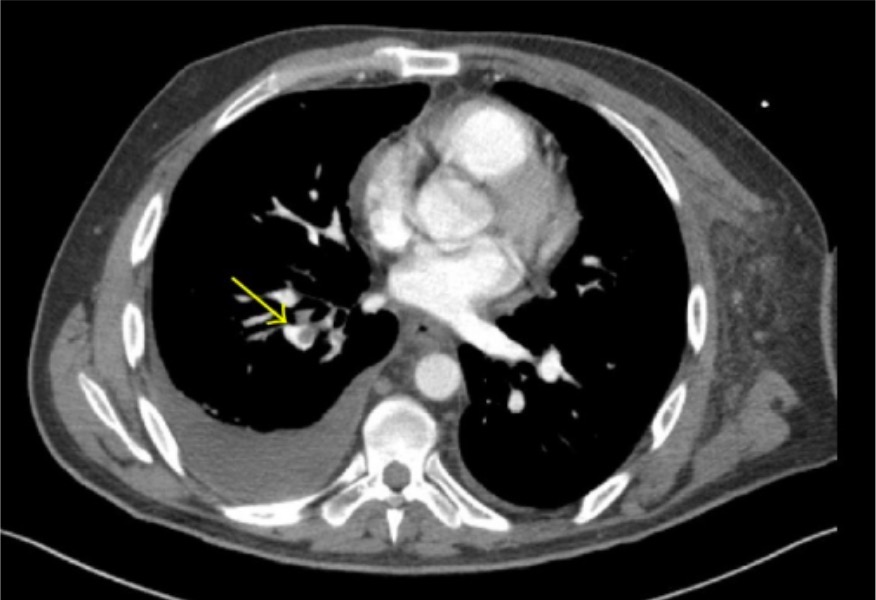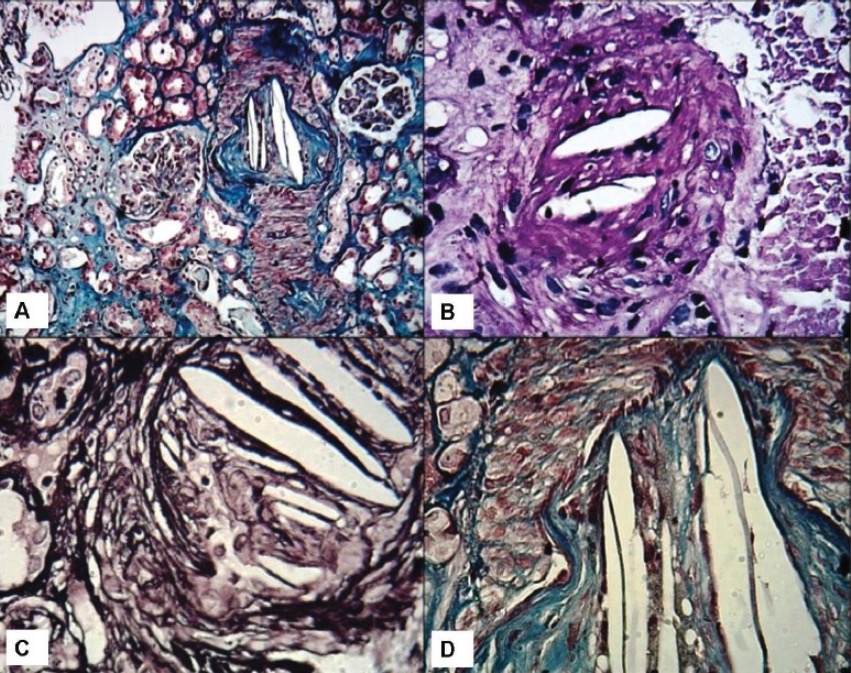Playlist
Show Playlist
Hide Playlist
Embolism
-
Slides 01 Stroke Neuropathology I.pdf
-
Reference List Pathology.pdf
-
Download Lecture Overview
00:01 Let’s talk about embolism and its pathophysiology. 00:05 Atrial fibrillation. 00:06 We just had this conversation. 00:08 Let’s say that you have a patient who’s elderly and is suffering from or had a history of myocardial infarction. 00:15 And now the patient starts having a heart rate that’s racing. 00:19 Racing. 00:21 Upon physical examination, the heart rate is approximately 200 beats per minute. 00:26 You take a look at the electrocardiogram, you find that the P waves are pretty much non-existent or wavy in nature. 00:33 At this point, you’re suspecting atrial fibrillation. 00:37 And for sure, you’re worried about thrombotic formation in the heart. 00:40 The next step of management, please? Prophylaxis with? Good. 00:45 Prophylaxis with anticoagulant. 00:48 Anticoagulant therapy reduces the risk of systemic embolization in patients with non valvular atrial fibrillation by almost 70%. 00:57 There are direct oral anticoagulants such as dabigatran, a direct thrombin inhibitor, or the factor Xa inhibitors like rivaroxaban, apixaban, or edoxaban. 01:09 Warfarin (a vitamin K antagonist) is indicated in patients with mechanical heart valves of any type or those with severe mitral stenosis of any cause. 01:18 The use of anticoagulant therapy is associated with an increased risk of major bleeding, including intracerebral hemorrhage but the risk of bleeding is usually much less than the risk of ischemic stroke in atrial fibrillation. 01:31 Aspirin, an anti-platelet drug, is not effective at reducing stroke as anticoagulation in atrial fibrillation but still carries a significant risk of bleeding. 01:43 Atrial fibrillation causes about 1 in 7 strokes, which tend to be more severe than strokes from other causes. 01:50 The other places that you could embolize include the renal artery or maybe the superior mesenteric artery and those are much more common. 01:57 However, when it comes to atrial fibrillation, it's important that you pay attention to the use of anticoagulant therapy to prevent CVA. 02:05 Now, granted a cerebrovascular accident could be only 10% the time when you embolize from the heart. 02:12 The other places that you would embolize would be maybe the renal artery, maybe the superior mesenteric artery, and those are much more common, much more common. 02:21 However, when it comes to anticoagulant the important that you pay attention to atrial fibrillation, and its prevention of CVA. 02:28 What else? Valvular heart disease, same thing. 02:30 Thrombi formation. 02:31 You’re always run into the risk of embolic type of focal stroke. 02:37 Wall motion abnormality. 02:38 What does that mean to you? Patient has suffered, let’s say, myocardial infarction or if patient has been drinking for a while and this alcohol is then causing damage to the heart. 02:49 And all of these, at some point in time, you’d recognize that the patient is getting fatigued. 02:54 And upon echocardiogram, you then calculate that the ejection fraction is less than 55%. 03:01 What’s going on? Well, now you’ll also notice that the wall motion is not present in the heart. 03:06 So if there’s no wall or if there’s, let’s say, decreased wall motion taking place with the heart, where is your blood? Remaining stagnant. 03:15 And once again, a perfect environment for thrombi/embolic type of event. 03:22 Dilated cardiomyopathy, no movement. 03:25 Septal aneurysm. 03:27 It's a patent foramen ovale. 03:29 Patient has a DVT, may result in a paradoxical emboli. 03:32 PFO, patent foramen ovale. 03:35 In the carotid artery. 03:37 Maybe atherosclerotic disease, beginning in the carotid artery, a common occurrence. 03:42 It could embolize into the head. Not good. 03:45 Or there could be even dissection taking place of the carotid, therefore resulting in embolization, resulting in focal ischemic stroke. 03:53 Are things becoming clear for you now at this juncture? Are you seeing as to what are the differences between focal and global? And at this point, under focal, our specific pathophysiology is emboli. 04:07 Another type of ischemic stroke, but this time we’ll have a thrombus formation. 04:12 So we’re not embolizing to the brain, is that clear? So it’s a thrombus formation taking place where? Oh, maybe in the middle cerebral artery. 04:19 Picture that for me, please. 04:21 Middle cerebral artery. 04:23 Why? Because I’m going to spend a little bit of time with that. 04:26 You have spent time with this in neuroanatomy. 04:28 And also please understand that MCA is going to supply the parietal lobe. 04:33 The parietal lobe. 04:35 In other words, the lateral portion of the parietal lobe, right? In the homunculus, the parietal lobe on the lateral aspect is going to supply what part of the body? What about this? Remember this? Homunculus. 04:49 See that ugly face that I just made? That face, plant it on the lateral aspect of the parietal lobe, please. 04:56 Because that’s what it’s affecting, the upper, upper portion of the head and neck and such. 05:01 Middle cerebral artery. 05:03 Now, depending as to which side is dominant or non-dominant for example, if you know your patient is left-handed, and then the right side of the brain is dominant. 05:12 If your patient is right-handed, then please note that it’s the left side of the brain. 05:16 And depending as to what side of the brain is dominant, if there’s a middle cerebral artery type of issue, maybe a thrombus formation, then you’re going to have a different type of symptoms that you’ve talked about before such as hemineglect and so on and so forth. 05:31 Majority are due to atherosclerosis. 05:33 Remember, we’re not embolizing up here into the brain. 05:37 We’re forming a thrombus most commonly due to atherosclerosis. 05:42 Risk factors are the common ones that we know so well, unfortunately. 05:46 Metabolic syndrome X including hypertension, diabetes, hyperlipidemia. 05:51 Other etiologies will include once again, those hypercoagulable states or maybe even drug abuse. 05:57 We’ve seen that amphetamine, heroine, cocaine. 06:00 Drugs are a big, big part of our society. 06:02 And oftentimes, you find these patients who are suffering from thrombotic type of focal ischemic stroke and on sickle cell disease as well. 06:10 Sickle cell disease, remember here, that sickling that will be taking place of your RBCs, anywhere up and down the body. 06:17 Anywhere, including up in the brain. 06:21 Common sites. 06:23 Carotid bifurcation for thrombus formation, origin of the middle cerebral artery or perhaps even the basilar artery or common sites where atherosclerosis would be settling in or thrombus formation would be settling in resulting in decreased blood supply to the brain. 06:42 Other causes of focal cerebral ischemia. 06:46 Here, we have arteritis. 06:48 Earlier, I mentioned a few conditions to you. 06:51 They included Henoch-Schönlein purpura or now called IgA vasculopathy. 06:57 I told you about temporal arteritis, a.k.a. giant cell arteritis, or something like microscopic polyangiitis. 07:03 The point is when you have an artery that’s undergoing inflammation, there might be decreased blood supply, resulting in a stroke, primary or secondary. 07:10 Etiologies, primary CNS angiitis, maybe even syphilis. 07:15 In worst case scenario, remember your blood vessels could be affected. 07:18 Tuberculosis, toxo. 07:20 Some of these infections may result in a type of arteritis or inflammation that’s taking place. 07:26 Others as I have mentioned earlier, temporal arteritis, PAN, polyarteritis nodosa, or connective tissue diseases. 07:33 Any of these could result in inflammation of your blood vessel, resulting in focal ischemic stroke. 07:41 Your patient has suffered a stroke. 07:43 And this time, the patient is unable to properly use different parts of the brain to speak. 07:50 But it’s actually the fact that the learning in the brain has been affected. 07:55 For example, you could have a Broca’s aphasia. 07:57 You’ve learned about that in neuroanatomy. 07:59 That’s your motor aphasia, which means you can understand, but the problem is you’re not able to properly carry out language. 08:06 Or you could do Wernicke aphasia depending on that part of the brain, 22 and such. 08:11 And so therefore, here you’re not able to properly understand Wernicke as sensory aphasia, but my goodness you’re just rambling off whatever type of garbage. 08:21 Meaning to say that, you know what? "I think that so and so is going to become president." We’re not going to name who, but then, oh my goodness, at the same time, "Did you know about how well I went to potty this morning?" Do you understand? It’s a lot of garbage that’s just coming out of your mouth. 08:39 And that would be a type of maybe a sensory. 08:42 Alexia would be inability to properly perceive written words. 08:45 A-lexia, without. 08:47 Agraphia. Graphia, think of it as trying to write down a graph but you’re not able to. 08:51 So you’re not able to properly write words, but it’s not related to weakness or sensory deficit. 08:57 That must be understood. 08:59 Now dysarthria, it will be slurred or stuttering speech due to motor weakness of incoordination. 09:07 But once again, the language centers would be intact. 09:10 Dysarthria. 09:11 If it’s apraxia, inability to carry out learned motor tasks. 09:15 And you just learned how to do, let’s say, you’ve learned how to do a Rubik's Cube. 09:21 But the problem is you’re not able to properly it out with the motor aspect. 09:25 We have ataxia and this literally would mean that the fact that you have a widened gait type of a stance. 09:32 And here once again, not due to weakness. 09:34 Usually, it’s the cerebellum that will be affected. 09:37 And dysphagia, and here it’s an inability to properly swallow. 09:42 All could be parts of stroke-like symptoms.
About the Lecture
The lecture Embolism by Carlo Raj, MD is from the course Stroke (Cerebrovascular Accident). It contains the following chapters:
- Embolism
- Thrombosis
- Arteritis
- Definitions
Included Quiz Questions
Of the following answer choices, what is the most common site for the formation of a thrombus that could lead to focal cerebral ischemia?
- Bifurcation of the carotid artery
- Anterior cerebral artery
- Vertebral artery
- Posterior cerebral artery
How does atrial fibrillation increase the risk of stroke?
- Thrombi can form in the left atrial appendage and then embolize into the cerebral circulation, causing a stroke.
- Atrial fibrillation increases the risk of bleeding and can cause a hemorrhagic stroke.
- Atrial fibrillation can cause hypertension, leading to a stroke.
- Rapid heart rate can lead to hypotension, causing a stroke.
- Inflammation of the blood vessels occurs with atrial fibrillation, resulting in a stroke.
What is a cause of a focal ischemic stroke due to inflammation of a blood vessel?
- Temporal arteritis
- Hypertension
- Diabetes
- Heart valve disease
- Atrial fibrillation
A stroke caused by a middle cerebral artery occlusion can cause Wernicke aphasia, resulting in...
- ...fluent but nonsensical speech due to impaired comprehension.
- ...difficulty in speaking due to loss of tongue sensation, resulting in garbled speech.
- ...difficulty in hearing what is asked, resulting in impaired responses to questions.
- ...difficulty in moving one's mouth in order to speak due to loss of facial motor function.
- ...dementia, causing nonsensical speech.
Customer reviews
1,9 of 5 stars
| 5 Stars |
|
2 |
| 4 Stars |
|
0 |
| 3 Stars |
|
1 |
| 2 Stars |
|
0 |
| 1 Star |
|
8 |
Dr Carlo Raj always makes me interested in listening to the lectures at all time. He is always Clear. thank You Dr. Raj
10 customer reviews without text
10 user review without text





